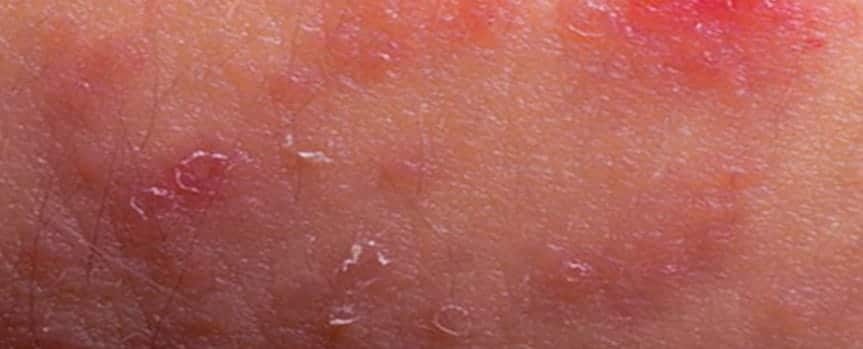What is Eczema?
Are you suffering from dry, red, bumpy and/or itchy skin? If so, you may be one of the nearly 15 million Americans experiencing atopic dermatitis, or eczema. Dr. Francisco Kerdel of Florida Academic Dermatology Center (FADC) in Coral Gables, FL sees countless cases of this common skin condition and understands the frustration that patients experience. “Eczema can result in very poor quality of life if left untreated,” he explains. “Patients often complain of loss of sleep due to intense itching.” The best course of action you can take is to receive prompt and proper treatment from a dermatologist.
What is eczema?
Eczema is a noncontagious skin condition that damages the skin barrier function. As a result, the skin becomes more sensitive and more prone to infection and dryness. This form of dermatitis can affect people of all ages and affects men and women equally. Infants are especially affected and it tends to run in families with a predisposition to other atopic diseases, such as food allergies, asthma and hay fever.
What causes an eczema flare up?
Severity of this condition varies by individual and in some cases it can even be treated and maintained with at-home remedies, over-the-counter medications and/or lifestyle changes. The first step to managing your symptoms is to attempt to identify your triggers. While some triggers, such as genetic predisposition, may be out of your control others can be monitored and maintained to eliminate flare ups. According to the National Eczema Association, common triggers include:
Dry Skin: When your skin gets too dry, it can easily become itchy, scaly, rough or tight, which can lead to an eczema flare-up.
Irritants: Everyday products and even natural substances can cause your skin to burn and itch, or become dry and red. These can include products that you use on your body or in your home. Surprisingly, even some natural liquids, like the juice from fresh fruit, vegetables or meats, can irritate your skin when you touch them. Common irritants include:
- metals (especially nickel)
- cigarette smoke
- soaps and household cleansers
- fragrances
- certain fabrics like wool and polyester
- antibacterial ointment like neomycin and bacitracin
- formaldehyde, which is found in household disinfectants, some vaccines, glues and adhesives
- isothiazolinone, an antibacterial that is found in personal care products like baby wipes
- cocamidopropyl betaine, which is used to thicken shampoos and lotions
- paraphenylene-diamine, which is used in leather dyes and temporary tattoos, among others
Stress: Emotional stress can also be an eczema trigger, but it’s not exactly known why. Some people report an increase in their eczema symptoms when they’re feeling “stressed.”
What methods of treatment can I try before seeing a specialist?
While we recommend consulting with your dermatologist at the first signs of symptoms, there are measures you can take:
- Use a humidifier to add moisture to the air in your home.
- Monitor and maintain your stress levels.
- Moisturize your skin using a cream or ointment. Lotions don’t work as well. Apply several times a day, including after you bathe or shower. Use lukewarm water in the tub or shower instead of hot.
- Use mild soaps and other products that are free of perfumes, dyes and alcohol. Look for products labeled “fragrance free,” “hypoallergenic” and “for sensitive skin.”
- Use skin products that contain ceramide. These moisturizers replace some of the barrier missing from your skin.
- Apply cortisone creams and ointments. Cortisone is an over-the-counter steroid found in hydrocortisone (Cortisone 10®) and hydrocortisone acetate (Cort-Aid®). They may help control the itching and redness.
- Take over-the-counter antihistamines for severe itching.
- Be cautious of certain clothing fabrics that can irritate the skin. Cotton is usually best while wool, silk and manmade fabrics such as polyester can cause irritation.
When is it time to see a doctor?
If the above at home methods are not giving you relief, it’s time to see a specialist.
Dr. Kerdel and the specialists of FADC urge patients to see a qualified dermatologist for prompt treatment. Patients often complain of loss of sleep due to intense itching
Although there is not a cure currently, eczema can be well maintained with the help of an experienced provider. Once in the care of your physician, additional treatment options may be necessary, including:
- Prescription medications: Your healthcare provider may prescribe steroid creams, pills and/or shots. There are also newer medications, called topical immunomodulators (TIMs) that show progress in treating patients who do not respond to other treatments. Your physician will explain potential options and side effects to find the best fit for you.
- Phototherapy: The ultraviolet light waves found in sunlight have been shown to help certain skin disorders, including eczema. Phototherapy uses ultraviolet light, usually ultraviolet B (UVB), from special lamps. This treatment is provided at FADC. Please call our office at (305) 324-2110 to learn more or to book an appointment.
- XTRAC®: XTRAC® is a laser therapy used to target patches of skin affected by certain conditions, including eczema. If medications, creams, and other lifestyle and dietary changes haven’t worked for you, XTRAC® laser therapy may be the solution. This treatment requires no downtime and is usually covered by insurance. This treatment is also provided at FADC. Please call our office at (305) 324-2110 to learn more or to book an appointment.
Sources:
https://www.hopkinsmedicine.org/health/wellness-and-prevention/managing-eczema-in-winter-and-year-round-a-parents-guide
https://my.clevelandclinic.org/health/diseases/9998-eczema
https://www.mayoclinic.org/diseases-conditions/atopic-dermatitis-eczema/symptoms-causes/syc-20353273
https://nationaleczema.org/eczema/causes-and-triggers-of-eczema/
